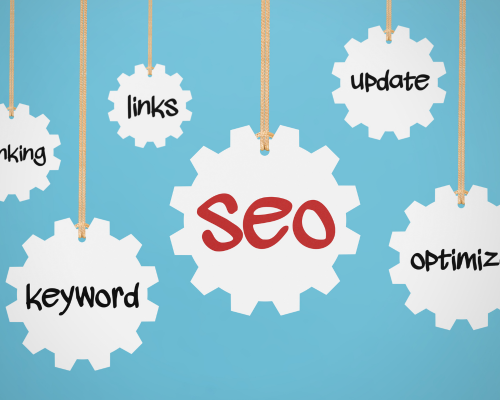
Intuitive and easy-to-use website design platforms such as SquareSpace and WIX can make building a website a breeze. Whatever your business and whatever your skill level, there’s a fair chance that if budget is an issue, you can still create something great without hiring a web designer.
But whether you go for a self-built website or do decide to hire a web developer, it is worth investing a bit of time to become an expert in one key area of websites – the importance and power of SEO.
SEO = Search Engine Optimisation
Why is SEO important?
SEO is all about increasing your website traffic by getting a better ranking on Google, Bing or Yahoo! So when a prospect types in “fabulous beauty salon in Hampshire” or “top BMW showroom in Kent”, your business appears in a decent position on the page of results. I’m not going to promise you’ll be number one on Google, that may not be realistic… but you can certainly do better. And appearing higher up the list gives you a better chance of converting potential customers.
How it works
Why is this important? Because according to HubSpot, “86% of consumers say search engines are the best way to get information.”
So which websites rank best? The likes of Google and Yahoo! will rank you highly if you have included important SEO elements across your website, such as title tags, keywords and image tags. So, for specialised copywriters like us, we need to include keywords and phrases such as: “copywriting strategy”, “compelling content”, “strategic copywriting for companies at the top of their game” or “how great copywriting can get your business noticed”.
Get your SEO elements right and you’ll increase the chance of online footfall.
What you can do
Start by:
- Ensuring you know your audience. What are they looking for, what are their needs? Make sure you are clear about who they are and how you can help them.
Next:
- Conduct thorough keyword research. SEO is all about finding your keywords, so do a broad keyword search before incorporating these across your website to attract your audience.
At the most fundamental level, if you don’t have the words “Country house hotel Wiltshire” somewhere on your website, nobody who types those words into Google is going to find you.
- Start by brainstorming your key terms and phrases. Alternatively, try using keyword search tools such as Google Search Console, Keyword Magic Tool, KeywordSurfer, Google Trends, or one of the many others available on the market. Otherwise, type a topic into your search bar to see related terms.
- Use simple words – it is important to minimise the use of jargon. Keep your copy clean and concise. This will help you come closer to the words and phrases people use when they conduct their search. For example, the space industry is highly complex and scientific but by simplifying terms and removing jargon, you can reach a broader audience. So, it is not only better for your audience but also for your website and SEO ranking.
Finally:
- Analyse your website and identify areas of improvement. Ensure you are using your SEO-friendly keywords across your website – from blog content to webpage, to image and video content. Crucially, however, you will have to intertwine them naturally throughout so your pages read well and appeal to humans as well as algorithms. There is no point stuffing each page with indigestible reams of keywords so you rank higher – but are a complete turn-off to potential customers who don’t want to do business with a robot!
If you don’t have the time to understand the complexities of SEO, don’t worry, you can call on Editing Edge. We’ll help you get your website singing, and we work with some very talented web developers and graphic designers too.


